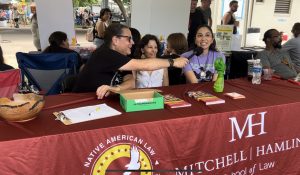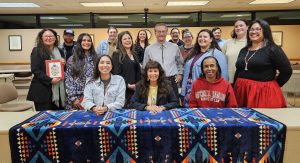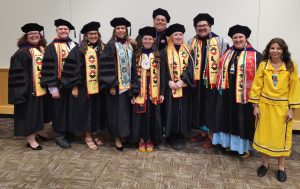Native students are vastly underrepresented in the legal profession and in law school. Recognizing this disparity, Mitchell Hamline has put intentional effort in recent years into developing opportunities for Native Americans to access a legal education, starting from before they even step foot on campus.
As a result, Native enrollment has been climbing each year in recent years, and Mitchell Hamline now has the most Native students—42—of any law school in the nation, based on the latest available ABA data from 2023.

Mitchell Hamline’s NALS Institute sharing information and celebrating Indigenous Peoples’ Day at the Minnesota State Fair, August 2024
The law school has strengthened efforts to recruit Native students, which has included hosting information sessions specifically about the Native American Law and Sovereignty (NALS) Institute, being present in community spaces, and partnering with organizations like the Pre-Law Summer Institute program and the American Indian Higher Education Consortium, which oversees Tribal Colleges and Universities, or TCUs, in the United States.
The entering class of 2021 included 11 Native students, followed by 12 and 14 in 2022 and 2023 respectively, and Mitchell Hamline welcomed 17 Native students in the entering class this fall, its highest ever.
“Because of the U.S. government policies and mandatory Indian boarding schools, education may often not be as valued in Tribal Nation communities, and many are still working through intergenerational trauma,” said Professor Angelique EagleWoman (Sisseton Wahpeton Oyate), director of the NALS Institute. “It is a long road to get to a point where they’re eligible to apply to graduate school and a legal program. When we do have students that are interested, the NALS Institute’s perspective is to create community and support and encouragement.”
One way Native students develop a tight sense of community is through opportunities with the Native American Law Students Association (NALSA), which is one of 43 NALSA chapters nationwide.

Mitchell Hamline students at NALSA’s annual “Rock Your Mocs” event, November 2024
“I am proud to be a student of Mitchell Hamline, where so much is done to build community amongst our Native peers and our allies,” said Keeli Siyaka (Sisseton Wahpeton Oyate), current NALSA president. “From scholarships to the NALS Institute and the Native American Law Students Association, Mitchell Hamline provides numerous ways to uplift the Native community. I look forward to seeing future generations of Native law students experience the same strong sense of community that I have.”
Students also remain connected to larger Native communities, whether they are taking classes in person or through Mitchell Hamline’s blended-learning enrollment option. The Twin Cities is a strong urban Native hub and home to Minnesota’s Native American Bar Association, with which many Mitchell Hamline alumni are engaged.
“With the blended-learning program,” EagleWoman added, “students are able to stay in their home communities and come to campus at the beginning and end of semesters. This makes a big difference for those who are employed by their Tribal Nation or community and need to maintain that role as well as attain a legal education.”

Students at the NALS Institute graduation reception, May 2024
In recent years, Mitchell Hamline has made significant strides in refining its offerings around Native law, including establishing the Native Justice Scholarship in 2015, reinvigorating the Native Law Clinic: Tribal Code Drafting upon EagleWoman joining the full-time faculty in 2018, and introducing the NALS Certificate in 2021.
This work is never done, and Mitchell Hamline remains committed to its mission of providing access to legal education, especially to those who have been historically underrepresented in the field.
“Each tribal student represents a nation. We have over 574 federally recognized Tribal Nations in the U.S., which are in need of legal services in all areas of the law,” said EagleWoman. “When a student’s tribal values align with the legal work they’re doing is when their work becomes the most meaningful.”
